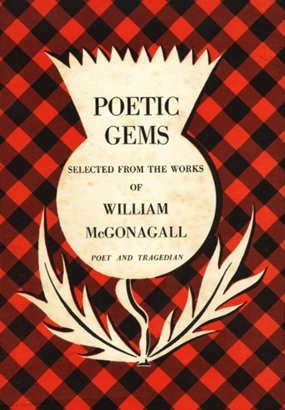I make no apologies for this week’s book review. Poetic Gems, selected from the works of William McGonagall was first printed in 1890, long before the advent of the ISBN numbering system. My personal copy is from the seventh impression struck in 1954 and was handed down by my father, so has sentimental value as well as literary merit.
William McGonagall, self-styled Poet and Tragedian, has carved his own niche in the literary world’s hall of infamy, as perhaps the world’s worst poet. Readers of McGonagall’s works have cringed at the verses but yet have helped them endure for more than 100 years.

McGonagall was the son of an itinerant Irish cotton weaver and describes 18 months of schooling before he joined his penniless parents in the cotton weaving workforce.
Initially he considered himself a thespian, and applied for the position of actor, to play Macbeth at a local theatre. After hearing him, the promoter of the theatre said that if McGonagall paid him one pound he would be allowed to tread the boards. On hearing this, his workmates in the cotton weaving game all clubbed together and paid the pound demanded and filled the theatre to hear his rendition. His delusions of grandeur had their beginnings there.
In the autobiography at the front of the book, McGonagall describes hearing the voices telling him to write poetry, and he very factually describes the euphoria that people with bipolar problems exhibit. He also claims that his poetry was “composed under the divine inspiration”.
Even the most brief examination of McGonagall’s divinely inspired poetry shows irregular scansion and an all-embracing need to find a rhyme, by the end of the line. (Or should that have been “rhyne by the end of the line”?)
In a McGonagallian retrospect, the Scotland Magazine was moved to record, “McGonagall is often mocked today for writing so many poems relating to contemporary disasters and battles, but such commemorative verse was very much a feature of Victorian literature. McGonagall merely did it worse than everyone else. Tennyson’s epic Charge of the Light Brigade was really just McGonagall with a competent rhyme scheme and effective scansion!”
Indeed, in his awful way, McGonagall in the 80 poems in his “Poetic Gems” did describe both historical and current events of the day, with items covering the battles of Bannockburn and Flodden Field. However, it is in his relating of the events of the day where he comes into his forte, in my opinion. Take for example the Railway Bridge of the Silvery Tay which begins:
“Beautiful Railway Bridge of the silvery Tay!
With your numerous arches and pillars in so grand array,
And your central girders, which seem to the eye,
To be almost towering to the sky.”
Unfortunately the bridge collapsed in a storm but was rebuilt. McGonagall celebrated the event in his poetic best:
“Beautiful new railway bridge of the Silvery Tay,
With your strong brick piers and buttresses in so grand array,
And your thirteen central girders, which seem to my eye,
Strong enough all windy storms to defy.”
Yes, there will never be another like William McGonagall!




